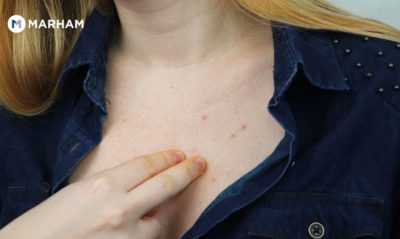Acne vulgaris is a common skin problem occurring on the chest. Acne breakouts on the chest are termed truncal acne, which can be in the form of papules, pustules, nodules, or comedones. Using skin-friendly lotions or simple home remedies can help reduce these symptoms.
Consult a dermatologist for immediate acne treatment.
Highlights
- Hormonal fluctuation, poor diet, dehydration, or excessive workout cause chest acne.
- Regular bathing, herbal remedies, and loose clothes help reduce truncal acne.
- Over-the-counter medication and medicinal body wash can heal acne on the chest.
Effective Ways to Reduce Chest Acne
Chest acne is common among both men and women. During summers, it causes itchiness, making you feel irritable – especially when you’re sweating. However, you can easily get rid of it with simple home remedies such as:
-
Regular Bathing
Bathing regularly with lukewarm water keeps your chest clean. It prevents skin from dirt, oil, and toxin build-ups, and removes dead skin cells. This reduces the likelihood of clogged pores, ultimately reducing acne outbreaks.
-
Avoid Tight Clothing
Wearing tight clothing can trap harmful bacteria and oil on your acne-prone chest. This slows down the process of healing. Also, the fabric of your clothes may irritate the affected skin, aggravating acne symptoms. Wear cotton clothes, as the fabric doesn’t irritate the damaged skin and promotes healing.
-
Use herbal remedies
A 2006 research study claims that herbal remedies such as tea tree oil help significantly reduce skin irritation caused by acne. It is also proposed that the antimicrobial properties of Asian skullcap herb can alleviate skin inflammation.
The anti-inflammatory and antibacterial properties of Aloe vera also reduce chest acne and prevent frequent acne outbreaks. It is also good for acne scars.
-
Exfoliate skin regularly
Once skin cells become dead, they remain on your dermis and clog pores. This increases sebum production and acne outbreaks.
Research published in 2023 suggests that you can avoid this situation by using a skin-friendly exfoliator twice or thrice a week.
-
Stay hydrated
Drinking enough water keeps the skin hydrated, flushes out toxins, and reduces sebum production. Drink a minimum of 8 glasses of water a day to promote skin hydration.
To ensure sufficient hydration, set reminders and check the color of your urine. Recede your intake of dehydrating beverages and incorporate juicy fruits and vegetables into your diet.
Medication for Chest Acne
The below-mentioned medication has been found to effectively help reduce bothersome chest acne:
- Dermatological Body wash: Dr. Joseph Lam in his 2017 research study claims that a benzoyl peroxide wash can cure chest or back acne. However, you may experience mild irritation or dryness on its first application. Additionally, exercise caution, as benzoyl peroxide has the potential to cause bleaching of towels and clothing.
- Azithromycin Tablet: Azithromycin is an excellent option for healing truncal acne. One study issued in 2019 claims 500 mg of azithromycin once daily for 3 days a week can help recover from acne vulgaris.
- Other oral antibiotics: Patients suffering from acute truncal acne are prescribed oral antibiotics to reduce irritation and kill microorganisms. Commonly prescribed antibiotics include tetracycline, doxycycline, and minocycline. To avoid acne resistance, follow the instructions and the complete regimen of antibiotics prescribed by your dermatologist.
- Hormonal therapy: In cases of polycystic ovary syndrome (PCOS), hormonal treatment may be advocated for chest acne related to hormonal imbalances. This may involve oral contraceptives (delivery control tablets) containing estrogen and progesterone, which can alter hormone levels and reduce acne.
Causes of Chest Acne
Truncal ance can substantially impact your quality of life. You may experience its mild or severe symptoms due to a number of underlying factors, which may include:
- Hormonal imbalance: Hormonal fluctuation, especially during puberty disturbs the natural balance of bacteria on your skin.
- Sugary foods: Excessive consumption of sugary foods stimulates insulin production. High insulin levels stimulate sebaceous glands to produce more sebum.
- Dehydration: Inadequate fluids in your body promotes dehydration, making your skin dry. The dry dermis is favorable to the growth of acne-causing bacteria.
- Sweat and humidity: Excessive sweating, primarily in a humid environment, can create favorable conditions for pimples-causing bacteria to thrive. Sweat can blend with oil, dead pores, and skin cells, which clog pores.
- Workouts: During physical activity, excessive sweat is produced. This sweat mixes with natural dermal oils, dead skin cells, and bacteria.
- Laundry detergents: Laundry detergents, especially those containing dyes or perfumes contain chemicals, which can potentially clog healthy skin pores.
- Perfumes: Perfumes contain synthetic ingredients which clog pores and irritate the skin.
- Stress: One research published in 2017 claims that high-stress levels can trigger hormonal imbalances and inflammation in the body, which can exacerbate chest acne.
- Poor hygiene: Poor cleansing, neglected skincare, or the usage of harsh soaps can irritate the skin.
Find healthy ways to manage stress, such as exercise, and relaxation techniques, or seek medical help to reduce acne symptoms.
Concluding Remarks
Understanding the causes of chest acne is essential for effective treatment. Excess oil, clogged pores, bacteria, hormonal changes, friction, and poor skincare habits are among the significant causes. By addressing these factors and adopting a complete skincare routine, you can get rid of chest acne.
If you have further queries, book an appointment with a highly-qualified dermatologist.
FAQs
1. Can Vaseline remove chest acne?
The occlusive effect of Vaseline traps bacteria in your skin. It stimulates sebaceous glands which increase sebum production leading to acne breakouts.
2. Will chest acne ever go away?
The signs and symptoms of chest acne can be easily reduced with acne creams. Eating a healthy diet can also help you manage the symptoms.

